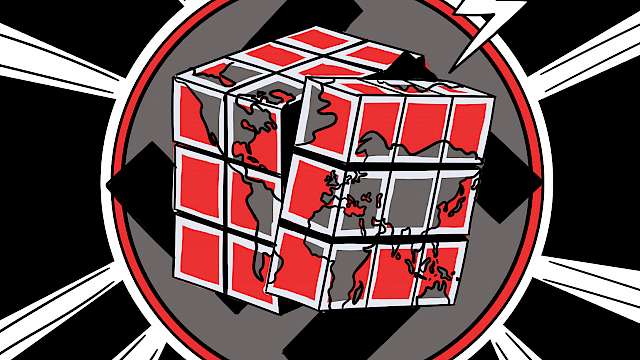It is not an easy time to be in a branded neo-Nazi group. Atomwaffen Division has dissolved itself, the leader of The Base was exposed as an American living in Russia, and Sonnenkrieg Division has been legally proscribed in the UK. Feuerkrieg Division has also been proscribed in the UK; its Estonian leader unmasked as a 13-year-old.
Meanwhile, group members have been arrested for a variety of offences across the US and UK (Sweep of arrests hits US neo-Nazi group connected to five murders; Teenage neo-Nazis jailed over terror offences; Youngest British terrorist sentenced for neo-Nazi manuals stash).
Societal attitudes towards the broader extreme-right are hardening. The January 2021 riot at the US Capitol was largely mocked within ‘siege culture’ – the rough subculture that has sprung up around these groups named for James Mason’s Siege, a 1980s newsletter since compiled into a key ideological text. Rioters were derided as Qtards and the Boomerwaffen.
Although some saw the value of disaffected Parler users spilling into Telegram, most were content to mock, secure in the knowledge that they were ideologically purer and far edgier than any Trump supporter.
One side-effect of hardening societal attitudes is greater push back from technology services.
Siege culture has long since been purged from the mainstream internet, forced instead to eke out an existence on the dark web and in the margins of less scrupulous or less well-resourced platforms. Recently, however, even Telegram, often nicknamed “Terrorgram” for its association with the extreme-right, seems to be drawing a line. Prominent channels have been banned which has, in turn, increased handwringing over security and future crackdowns among the remaining extremist userbase.
A further possible sense of unease may come from the fact that siege culture, for all its rhetoric, has yet to give rise to a successful terrorist campaign. Although keen to be associated with “saints” such as Brenton Tarrant and others, the reality is that little of the recent right-wing terrorist violence seems to have been motivated by ‘Siege’.
Overall siege culture has proved to be murderous and plot-heavy, but otherwise surprisingly inert in leading to actual terrorist attacks. Partly this can be explained by the focus on ideological purity and preparation for the “collapse”, stealing focus from terrorism and acting as a break on terrorist action. It is also down to early detection in several cases by law enforcement.
What next for siege culture?
It is something of a cliche to point out that every generation needs to make its own mistakes, however, the lessons that went into the doctrine of leaderless resistance set out by Louis Beam in the 90s are being relearned by the current generation.
Organisations built on structure and trust are vulnerable to infiltration, betrayal, and surveillance. Only lone activism in service of a shared ideological goal offers complete protection.
Some channels are publishing material that advocates for a new form of ultra-local and offline activism. Rather than using the internet to network and form branded organisations, this approach rejects online organising and advocates recruiting from local communities and social circles directly and discretely.
One text circulating on Telegram includes advice to “AVOID named groups like the plague. If it's got a logo, a name, and an online presence, that's three strikes, run for your life.”
If it's got a logo, a name, and an online presence, that's three strikes, run for your life.
Readers are told instead to join local community networks such as the gym and Christian groups, to establish themselves as having good character, and to discretely sound out those who may hold views that “would see them strung up by the system.”
This approach retains the hatred for the “system” characteristic of ‘Siege’ but seemingly encourages less direct violence as supporters are encouraged to go on the defensive until the time is right.
This is not so much a break with ‘Siege’ but perhaps a critical reappraisal. While the text has achieved legendary status for its violent rhetoric, it can be read as being lukewarm on violence at best.
In the final issue of ‘Siege’, Mason encouraged readers to choose between “TOTAL ATTACK” and “TOTAL DROP-OUT”, with the latter being framed as “the only sane and realistic choice”. Dropping out entailed living apart from the system, preparing, and waiting for the revolution to “come and find us”.
This suggests a far more reclusive and clandestine style than that we have seen so far from siege culture groups.
What does this mean for policy?
Organised and violent neo-Nazism is unlikely to perish from the Earth. However, its perpetrators are likely to be joined by a more secretive set, keeping themselves to themselves and quietly preparing in local networks for the upcoming collapse.
The internet is too good a resource for any extremist to ignore completely, so some digital footprint will likely remain, but a reduction in online organising will make activists and potential security threats far harder to detect and investigate.
As supporters passively consume content rather than actively participate online, this approach is likely to reduce digital footprints, and evidence for later prosecutions may be less easily collected in these cases.
Inversely, without the networking power of the internet activists are likely to find meeting like-minded community members difficult. This approach is bound to lead to some awkward conversations at the local bowling alley or shooting range.
If they do not attempt to accelerate the collapse, these quiet neo-Nazis may present little by way of a security problem. Much like sovereign citizens they may remain submerged in regular communities, only really creating issues when they come up against agents of the “system” and local ideological opponents.
One point of friction may be where these local networks seek to ensure their security, taking steps to secure their local areas.
Returning to Telegram advice, the same document suggests creating “no-go zones” and erecting “physical barriers” where possible.
Ideological violence may be in danger of being lost in the mix of wider criminal violence and hate crime. Without organisational and rhetorical markers to identify them, political violence and terrorism are sometimes missed by law enforcement (e.g. the National Socialist Underground in Germany and Peter Mangs in Sweden).
Ideological violence may be in danger of being lost in the mix of wider criminal violence and hate crime.
A further concern is that any one of these groups may get it into their heads that the collapse has come and the time for action is now as a result of either local or national factors. This lends extra jeopardy to ideologically relevant events such as protests and criminal cases both locally and nationally.
Alternatively, local groups or individual actors may simply get impatient waiting and resume the banner of violent accelerationism with enhanced capabilities derived from planning, training, and a supportive local organisation.
The visibility of the resurgent extreme-right in recent years has made them an obvious security threat. Any shift to a less visible strategy may place greater emphasis on local knowledge, human intelligence, and broader subcultural awareness, while simultaneously reducing the scope for online work.
Read more
- Gardell, M. (2018). Urban Terror: The Case of Lone Wolf Peter Mangs. Terrorism and Political Violence, 30(5), 793–811. https://doi.org/10.1080/09546553.2018.1444796
- Jackson, P. (2020) Trans-National Neo-Nazism in the USA, United Kingdom, and Australia. GW Program on Extremism. https://extremism.gwu.edu/sites/g/files/zaxdzs2191/f/Jackson%20-%20Transnational%20neo%20Nazism%20in%20the%20USA%2C%20United%20Kingdom%20and%20Australia.pdf
- Lee, B., & Knott, K. (2021). Fascist Aspirants: Fascist Forge and Ideological Learning in the Extreme-Right Online Milieu. Behavioral Sciences of Terrorism and Political Aggression. https://www.tandfonline.com/doi/full/10.1080/19434472.2020.1850842
- Busher, J., Holbrook, D., & Macklin, G. (2019). The internal brakes on violent escalation: A typology. Behavioral Sciences of Terrorism and Political Aggression, 11(1), 3–25. https://doi.org/10.1080/19434472.2018.1551918
- Ware, J. (2019). Siege: The Atomwaffen Division and Rising Far-Right Terrorism in the United States. ICCT. https://icct.nl/publication/siege-the-atomwaffen-division-and-rising-far-right-terrorism-in-the-united-states/
Copyright Information
As part of CREST’s commitment to open access research, this text is available under a Creative Commons BY-NC-SA 4.0 licence. Please refer to our Copyright page for full details.
IMAGE CREDITS: Copyright ©2024 R. Stevens / CREST (CC BY-SA 4.0)





